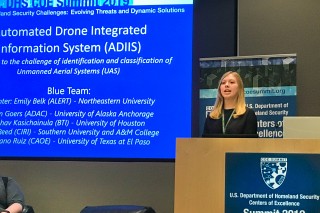Emily Belk Wins DHS COE Summit Grand Challenge Competition
Computer Engineering and Computer Science BS student, Emily Belk was part of the winning team at the 2019 Department of Homeland Security (DHS) Centers of Excellence (COE) Summit Grand Challenge Student Competition held on July 31st at George Mason University in Arlington, Virginia. The DHS COE Summit is an annual event held to showcase the innovative research being conducted by the COE community as they work with industry partners and government collaborators and end-users to develop R&D tools and solutions to respond to the evolving threats and challenges facing the nation. Emily was attending the Summit as a student representative for the ALERT (Awareness and Localization of Explosives-Related Threats) COE led by Northeastern University and Director Michael B. Silevitch, Robert D. Black Professor in the Department of Electrical & Computer Engineering. Emily works as an undergraduate researcher on the ALERT project known as “Multi-Transmitter/Multi-Receiver Blade Beam Torus Reflector for Efficient Advanced Imaging Technology” led by ALERT Deputy Director, Professor Carey Rappaport.
The Grand Challenge Student Competition was designed to foster collaboration among the talented undergraduate and graduate students engaged in the research and work force development efforts within the COE community. Emily said, “The opportunity to work with students from different disciplines and centers of excellence to tackle the challenge at hand yielded many diverse and exciting ideas.”
With the goal of and emphasis on, developing innovative ways to approach homeland security concerns, diverse teams of multi-disciplinary COE students were formed to address this year’s Grand Challenge prompt which was to “identify an emerging threat to homeland security posed by Unmanned Aerial Systems (UAS) and develop a strategy to counter it. The student teams began brainstorming on the challenge on July 29thth and had to submit their final presentation and abstract by the evening of July 30th. “Having only 24 hours to define a problem, develop a solution, and create a presentation made for a very stimulating environment,” said Emily.
Emily led the final presentation for her team, including Tristan Goers from the University of Alaska Anchorage, Keshav Kasichainula from the University of Houston, Trinity Reed from Southern University and A&M College and Emiliano Ruiz from the University of Texas at El Paso which was entitled, “Automated Drone Integrated Information System (ADIIS).” ADIIS was envisioned to address the challenge in identifying and classifying UAS through a combination of registration incentives and tracking methods. An esteemed panel of judges, including leaders from DHS and industry, reviewed the presentations and selected Emily’s team, as the first place team of the five competing teams based on their innovative concept and articulate presentation.
“Our solution created a database that stored information about all drones flying in the U. S. airspace, and my favorite tool that we implemented was our Automated Point Evaluation System (APES). APES could calculate the perceived threat level of any drone”, said Emily. “We also implemented an APES precheck that, similar to TSA precheck, would allow trusted companies to purchase an initial stage of vetting in return for a more streamlined experience flying their commercial drones”.
Emily and her team received a first place certificate of recognition from William N. Bryan, Senior Official Performing the Duties of the Under Secretary for DHS S&T at the Grand Challenge Award Presentation and presented their winning proposal to the DHS Summit audience on August 1st.


There are currently no comments.
The comments are closed.